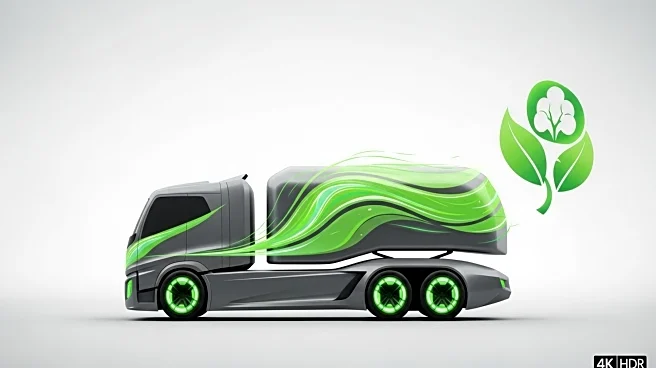What is the story about?
What's Happening?
AkzoNobel has launched its first fleet of fully electric and hydrotreated vegetable oil (HVO) powered trucks in the UK, in collaboration with XPO Logistics. This initiative is part of the company's broader strategy to reduce its transport emissions by over 50%, saving approximately 3,000 tonnes of carbon dioxide annually. The move supports AkzoNobel's goal to halve its Scope 1 emissions by 2030, using a 2018 baseline. The fleet includes two electric trucks operating from the Slough site to serve London, while the HVO-powered trucks will manage nationwide deliveries. AkzoNobel claims to be the first paint brand in the UK to deploy large-scale electric heavy goods vehicles under the Government’s Zero Emission HGV and Infrastructure Demonstrator (ZEHID) programme.
Why It's Important?
This development is significant as it represents a substantial step towards reducing carbon emissions in the logistics sector, which is a major contributor to global greenhouse gas emissions. By adopting electric and HVO-powered vehicles, AkzoNobel is setting a precedent for other companies in the industry to follow, potentially accelerating the transition to more sustainable transport solutions. The initiative not only aligns with global efforts to combat climate change but also supports the UK government's objectives to achieve net-zero emissions. Companies that adopt similar strategies may benefit from reduced operational costs in the long term and improved brand reputation among environmentally conscious consumers.
What's Next?
AkzoNobel's initiative is likely to prompt other companies in the logistics and manufacturing sectors to consider similar sustainable practices. As the company continues to implement its decarbonization strategy, it may explore further innovations in sustainable transport and logistics. The success of this initiative could lead to increased investment in electric and alternative fuel vehicles, as well as infrastructure to support these technologies. Stakeholders, including government bodies and environmental groups, may closely monitor the outcomes to assess the feasibility and impact of such initiatives on a larger scale.
Beyond the Headlines
The introduction of HVO-powered trucks highlights the potential for alternative fuels to play a significant role in reducing emissions. However, the production and sourcing of HVO must be managed sustainably to avoid negative environmental impacts. Additionally, the shift to electric vehicles requires substantial investment in charging infrastructure and energy supply, which could pose challenges. The broader adoption of these technologies may also influence regulatory policies and standards in the transport sector, encouraging further innovation and collaboration among industry players.















